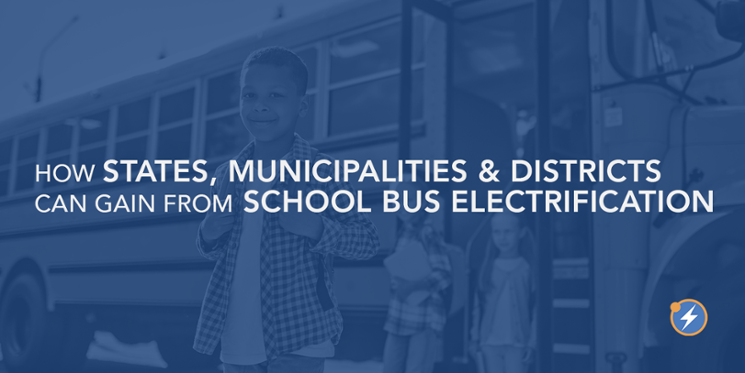
Today, 95% of school buses in the United States are powered by diesel, emitting more than 40 toxic chemicals from their exhausts each day. The 24 million children who ride these school buses are exposed to five to 15 times more air pollutants than those who do not. In order to eliminate these harmful emissions, mitigate their health impacts on school-aged children, and reduce the effect of school transportation on climate change, policymakers should take action to electrify school bus fleets. This transition would be especially beneficial in regions prone to electricity supply disruptions caused by natural disasters, because electric school buses can also provide emergency backup power in the event of a grid failure. The challenge now is how to get it done – fast.
Over the past few months, a team of 13 graduate students in Columbia University’s MPA in Environmental Science and Policy program worked to develop for AEE recommendations to accelerate the adoption of electric school buses in some of the country’s most promising markets. Through a series of policy and financial recommendations, we identified pathways to adoption in support of AEE’s ongoing work in three fast-growing Sun Belt states – Arizona, Florida, and Texas – in a report, “Accelerating Electric School Bus Adoption for Grid Reliability and Community Resilience.”
The report discusses the current landscape surrounding energy markets and regulation in these states, analyzes political considerations affecting electric school bus adoption, and provides recommendations for accelerating the transition to emissions-free school transportation fleets. While states, municipalities, and school districts vary, this report identifies factors that indicate whether electric school bus adoption would be supported and how it could be implemented to reduce political, financial, or technological friction.
Electric school buses cost more than their diesel counterparts, though electric buses have advantages in fuel and maintenance cost savings, salvage value of batteries, and potential to tap other revenue streams that defray the initial cost over time. We found that, on a lifetime basis, electric school buses have already attained nominal cost parity with diesel buses in Texas and Florida, but remain about 60% more expensive than diesel in Arizona. The promise of future savings may not be enough for school districts to justify the upfront cost of electric school bus procurement, however. Still, policy incentives and out-of-the-box financial thinking can narrow the cost gap and create more favorable conditions for electric school bus adoption.
Potential financing options to bring down the costs associated with purchasing electric school buses include certain federal programs, municipal bonds, and grant funding from the Volkswagen emissions scandal settlement. On the debt side, there are third-party financing options available to school districts interested in adopting electric school buses, but credit history and other factors may limit a district’s access. For communities that lack the resources to seek this type of financing, a more regional approach or support from a green bank could bridge the gap and help make procuring electric school buses more feasible.
Just as promising are the partnerships and revenue streams that electric school buses can feasibly tap to not only defray their cost but make them pay off. In each of our three focus states – and states like them – there are benefits electric school buses can potentially provide the electric power grid and contribute to community resilience. In deregulated markets such as Texas, with the proper market rules, electric school buses should be able, through vehicle-to-grid technology, to participate in wholesale energy markets like ERCOT, engaging in energy arbitrage by charging up at when electricity is cheapest and selling back to the grid in summer evenings when prices are high; they can also provide ancillary services that operators procure to manage the grid. Vertically integrated markets, such as those in Arizona and Florida, don’t offer the same direct market opportunities, but the utilities that manage electricity generation and consumption could stand to benefit from partnering with school districts or bus operators to use buses as demand management resources.
In addition, the report lays out a framework for the adoption of electric school buses by state and local authorities, consisting of five main steps: making the argument, setting goals, nurturing partnerships, enhancing incentives, and overcoming regulatory barriers. Each of these steps points toward school districts, municipalities, and/or states that would most readily adopt electric school buses and assists them in accelerating the adoption. By means of these steps, key decision makers not only gain access to available federal, state, and local funding, but also better understand other avenues to reduce the costs of buses, while reinforcing the resilience benefits such adoption can bring to their communities. By arming decision makers with the tools to access, afford, and commit to electric school buses, advocates can smooth the transition to electric bus fleets.
While there are still barriers to adoption, electric school buses carry the potential to change the landscape of transportation in the U.S. The particular suitability of school buses for electrification – their local travel routes, predictable daily and seasonal downtimes – and clean-air benefits for vulnerable children and their communities make for a compelling value proposition. The policy and financing framework in this report can help advocates identify specific locales that are best equipped to transition to electric school buses quickly, establishing a market that can ultimately scale across the country.
Download AEE’s “Accelerating Electric School Bus Adoption for Grid Reliability and Community Resilience” by Columbia University graduate students by clicking below.
